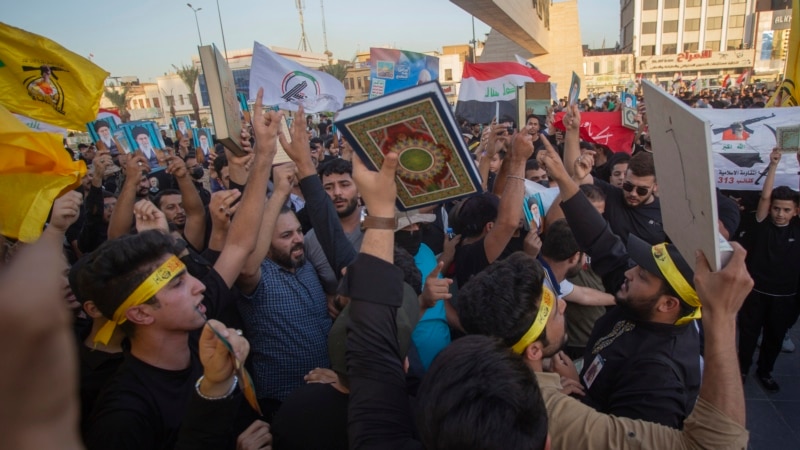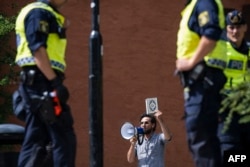Maduro Invents European Leaders’ Complicity in Quran Burnings
On August 6, Venezuelan President Nicolas Maduro sought to implicate European leaders in anti-Islam activists’ burning of the Quran in Denmark and Sweden in recent months.
“I condemn these racist acts of hatred against Muslim nations,” Russia’s TASS news agency quoted Maduro as telling Al Mayadeen TV, a Lebanon-based broadcaster.
“The silence of European leaders over the burning of copies of the Quran is surprising, which amounts to their complicity in the crime.”
That is false.
Swedish, Danish and European authorities have condemned the burning of the Quran. Following the latest incidents, Sweden and Denmark announced that they are looking into measures to curb the burning of holy books that will not infringe on free speech protections.
This year, a series of Quran-burning protests in Sweden and Denmark have sparked outrage in the Muslim world and created security concerns for both countries, with broader political implications for the West.
In a particularly controversial action, Salwan Momika, an Iraqi refugee in Sweden, desecrated and burned a Quran outside Stockholm’s largest mosque on June 28, the first day of Eid — a significant Muslim holiday.
After Salwan threatened to burn a copy of the Quran at a separate protest outside the Iraqi Embassy in Stockholm, demonstrators in Iraq stormed the Swedish Embassy in Baghdad on July 20, setting part of the complex on fire.
Iraq expelled Sweden’s ambassador, although Iraqi authorities also condemned the attack on the embassy compound.
On June 29, Sweden’s Foreign Ministry condemned the desecration and burning of the Quran.
“The Swedish government strongly rejects the Islamophobic act committed by individuals in Sweden. This act in no way reflects the opinions of the Swedish Government,” the ministry said in a statement.
Sweden is looking into measures that would allow police to stop Quran burnings on national security grounds that won’t require making changes to its free speech laws.
Swedish Prime Minister Ulf Kristersson said on August 1:
“In a free country like Sweden, you have a great deal of freedom. But with that great degree of freedom comes a great degree of responsibility. Everything that is legal is not appropriate. It can be awful but still lawful.”
The European Union’s top foreign policy official, Josep Borrell, offered a similar assessment in a July 26 statement:
“The desecration of the Quran, or of any other book considered holy, is offensive, disrespectful and a clear provocation. Expressions of racism, xenophobia and related intolerance have no place in the European Union.”
“We continue to stand up for freedom of religion or belief and freedom of expression, abroad and at home; but not everything that is legal is ethical.”
In Denmark, a group called the Danish Patriots has carried out a series of Quran-burning protests this year, including in front of the Iraqi, Turkish and Egyptian embassies in Copenhagen.
Danish Foreign Minister Lars Lokke Rasmussen condemned the burning of the Quran in a July 30 statement:
“The Danish government has clearly distanced itself from and condemned the burnings of the holy Quran. The burnings are deeply offensive and reckless acts committed by few individuals. These few individuals do not represent the values the Danish society is built on.”
Rasmussen said the Danish government was seeking a “legal tool” to prevent anti-Islam activists from burning the Quran.
“The Danish government will therefore explore the possibility of intervening in special situations where, for instance, other countries, cultures, and religions are being insulted, and where this could have significant negative consequences for Denmark, not least with regard to security,” he told Denmark’s national broadcaster on July 30, Reuters reported.
While the tensions have ratcheted up in recent months, the Quran-burning controversy in Northern Europe goes back years.
In February 2017, prosecutors in Denmark charged a Danish man with blasphemy for burning a Quran and uploading the video to Facebook in December 2015.
Those charges were dropped after Denmark’s 334-year-old blasphemy law, which empowered authorities to fine and even jail individuals who insulted a religion, was revoked in June 2017.
Sweden revoked its blasphemy law in 1970.
Rasmus Paludan, a far-right politician with Danish and Swedish citizenship, has burned and desecrated the Quran on multiple occasions in recent years, and encouraged others to do the same.
On January 21, Paludan reignited controversy when he burned a Quran outside of the Turkish Embassy in Stockholm, sparking a diplomatic crisis.
Turkey has cited Sweden’s “complicity” in the Quran-burning protest as a pretext to thwart Sweden from joining the North Atlantic Treaty Organization (NATO).
Paludan’s permit for the January 21 protest was paid for by Chang Frick, a former contributor to the Russian state-broadcaster RT. Frick denies his former affiliation with RT was connected to his decision to finance the protest permit.
Swedish authorities have accused Russian state media of spreading false stories in Arabic claiming Stockholm supports the Quran burnings, in part to stymie Sweden’s NATO bid.
In February, Swedish police refused to issue permits for Quran-burning protests outside the Turkish and Iranian embassies on security grounds. But Swedish courts ruled the police could not curtail freedom of assembly and the right to demonstrate over unspecified terrorist threats.
This article has been archived for your research. The original version from Polygraph.info can be found here.





